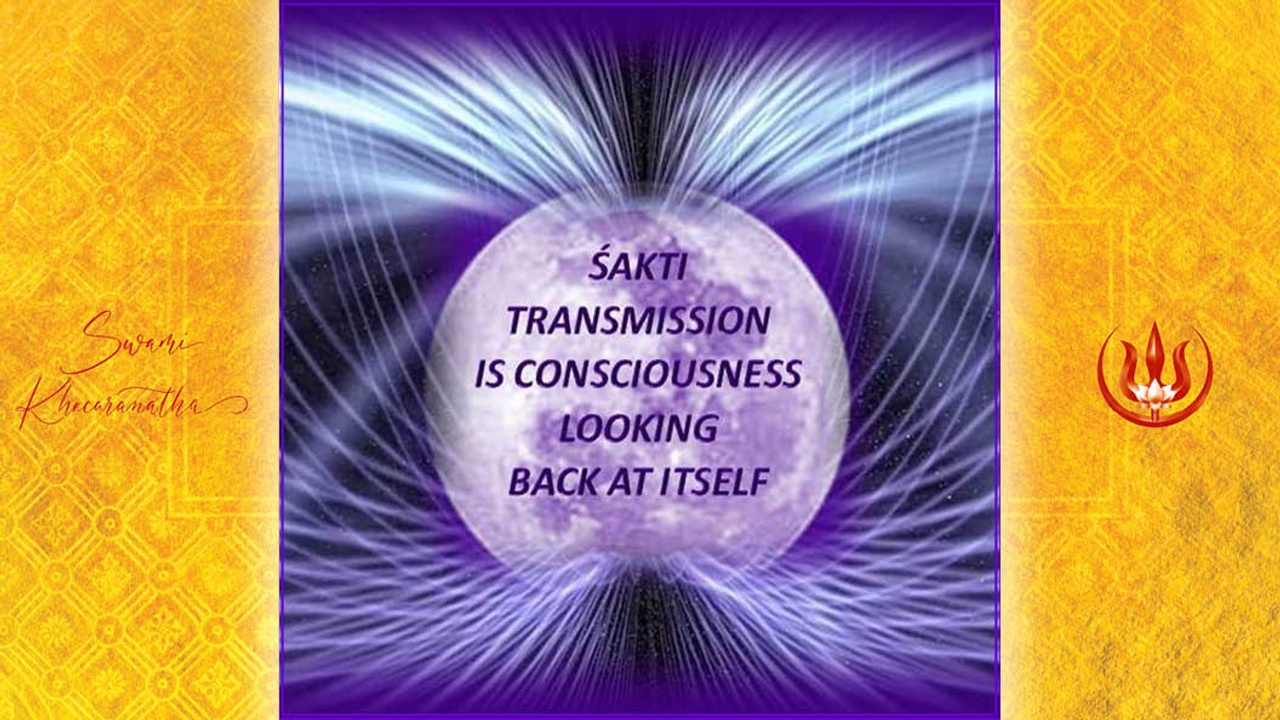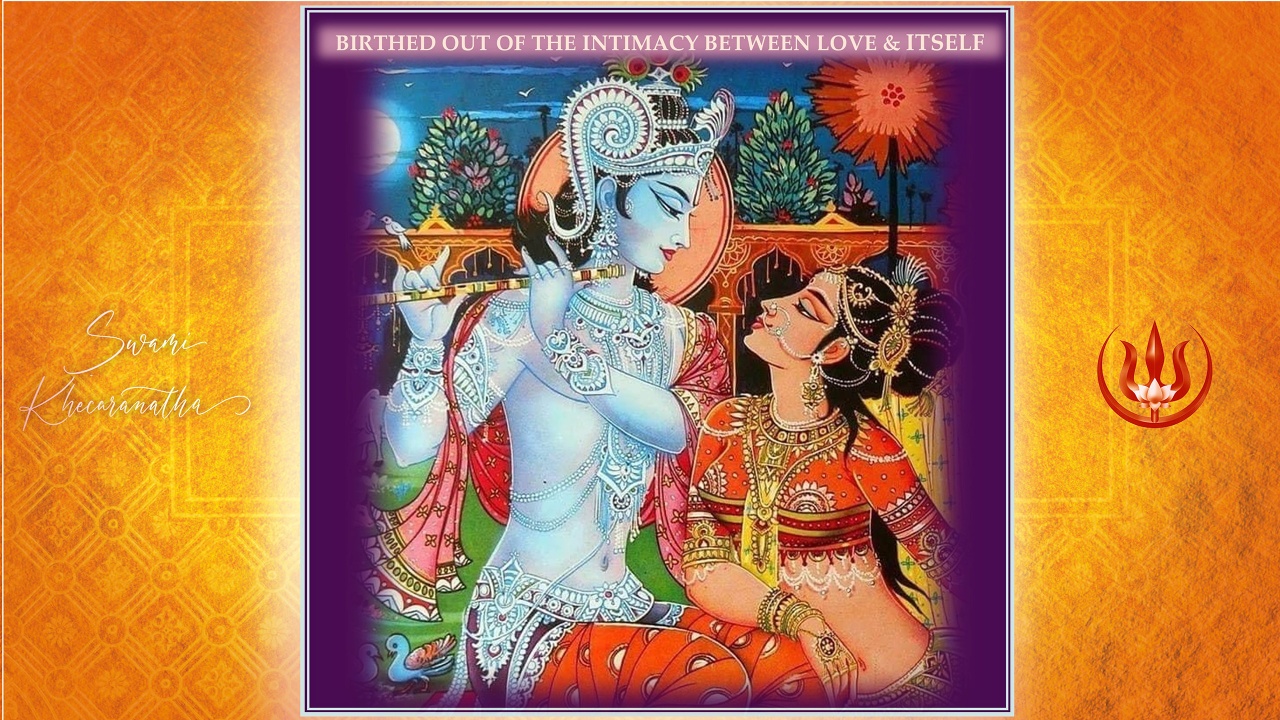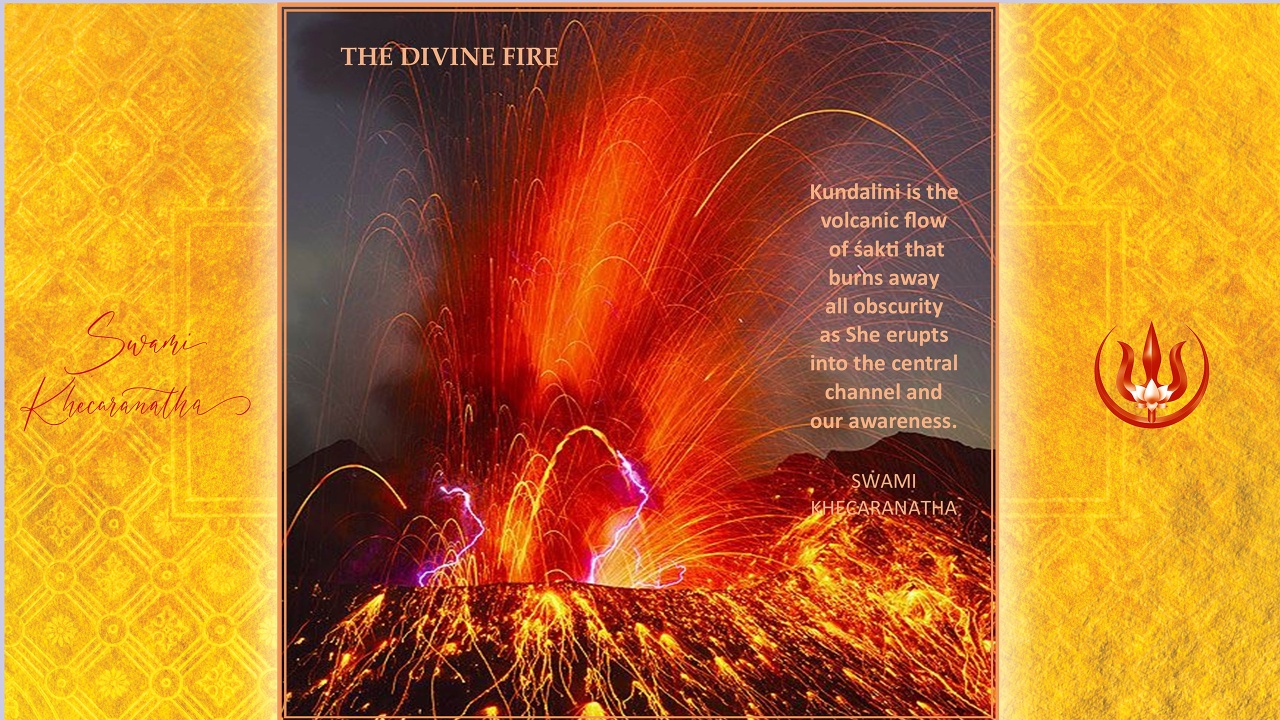Śakti Transmission

Śakti transmission is Consciousness looking back at Itself. Svātantrya Śakti is the autonomous power of Consciousness to forever manifest Its own fullness and perfection, expressing Itself as a matrix of energy called Kauliki Śakti.
Kauliki Śakti is Consciousness becoming the universe, individuating into kuṇḍalinī and into you and me. Because kuṇḍalinī śakti is everywhere, śakti transmission is not the movement of energy from one location to another. Instead, it is a contact between two points held within the dynamic infinite field of Oneness. That is where transmission takes place.
What is this energetic field of Consciousness? Max Planck, a German theoretical physicist, whose discovery of energy quanta won him the Nobel Prize in 1918, said this:
As a man who has devoted his whole life to the most clear headed science, to the study of matter, I can tell you as a result of my research about atoms this much: There is no matter as such. All matter originates and exists only by virtue ...
The Power of an Open Heart

When heart is contracted, the knowledge in the soul assumes the nature of ignorance. Once this contraction ends its unique essential nature shines again. Tantraloka, 13:213
Engaging in sādhana (spiritual practice) is the conscious choice to allow the grace that is ever-present in creation to reveal itself in us. Revelation is the very purpose of our human existence, and there is no higher aspiration in life than to seek to recognize that God dwells within us as our Self. Over the past fifty-plus years of teaching, of supporting students in their wish to know that divinity, it has become clear to me that one aspect of spiritual work is of vital importance: that true sādhakas must not only make contact with a place of higher consciousness within themselves; they must be able to maintain that contact as they engage their life.
The immersion into higher consciousness requires a significant shift in our awareness. When we commit ourselves to spiritual practice, we are asking for a profoun...
This Glorious Journey

The ocean of Consciousness pulsating within your heart is illuminated by the Sky of Consciousness that is Śiva’s Heart. Hṛdayavyāpti means penetration and absorption into the Heart of God. This is the search of Consciousness for Itself within each of us, and as such, it is the search inside the Heart.
This glorious journey to freedom begins when the Light of God sets fire to our heart, awakening us to the spiritual life. Endowed by that initial grace with spiritual sight, we surrender ourselves into the seemingly distant memory that everything we see is none other than God’s Light.
The syllables that comprise the name Śiva translate as “that in whom everything rests” (Śi) and “by whose power everything moves” (va). This is another way of talking about Consciousness and energy. Consciousness is that in which all life rests, and the power or energy that arises from within Consciousness is called Śakti. As we look at these fundamental aspects of existence, what we’re really exploring i...
Birthed Out of Love

It is not by escaping our humanity or trying to disappear into the transcendent, but in finding that place where they come into union, the mystery that is inherently inside all of us is revealed.
Throughout the ages, people have asked these fundamental questions: “Why am I here? What is the relationship between me and the Divine?” It is our sādhana that brings us to the understanding that we were birthed out of the intimacy between Śiva and Śakti, Consciousness and energy. It is that dynamic interchange, that intimacy of love that creates and gives life.
When the eternal and the human meet, love is born; that is love doubling back on itself. By finding that place of union within us, we recognize that we, too, are birthed out of love.
Realization is living that union in our own lives, with heart wide open. It is the revelation of the mystery that is inherently inside all of us. How amazing that this could be true!
If we accept the premise that we were birthed out of the love and joy...
The Petrified Heart

Atrophied from non-activity, swallowed in the quicksand of neglect, compressed under layers of tension, the soul becomes a fossil imprisoned in time.
Regardless of where we begin our spiritual journey, or how easy or arduous it is, the great masters of the past tell us there is a common progression that takes place. Scripture provides a sophisticated understanding of the transformation we undergo, as we move from being buried under our tensions to abiding in the highest Consciousness and coming to know ourselves as God.
In nondual Tantric tradition, the upāyas describe this path of walking back into God’s heart. The journey begins the moment God says, I am you. This is an act of God’s grace, or what tradition calls śaktipata.
To support the unfolding of that grace, we meditate regularly and make conscious choices as we move through our lives. In addition, our practice includes śakti transmission, in which there is a simultaneous conveyance of both śakti (energy) and Consciousness. ...
Dimensions of the Central Channel - Part 2

Kuṇḍalinī, the Goddess who is known in three aspects as Parā, Parāparā, and Aparā, embodies the powers that express God’s awareness. Those five powers of the Divine are Consciousness, bliss, will, knowledge, and action. All energy and form stems from some combination of those powers.
The field of Consciousness is one of infinite, pure, unbounded awareness, and the overflowing of Its own blissful nectar is both the genesis and the expression of divine joy. Everything in life — the birds, the bees, you, the cosmos — is the manifestation of the joy of Consciousness, and Śiva knows Himself as all things. Through His own knowledge of Himself, the joy of that knowledge, and the action that emerges from that knowledge, Śiva expresses all of existence. The Goddess, as the trifold power of God, is that combined dynamic. She is three and yet She is not different from or separate from the One.
These Energies Manifest as Us
The suṣumṇa, iḍā, and piṅgala are the three primary nāḍīs, or channels,...
Dimensions of the Central Channel – Part 1

There are four dimensions of the central channel, each nested inside the other like a telescoping antenna. The outer sheath is the Suṣumṇa Nāḍī (the grossest channel, which goes from the base of the spine to the ajna cakra), next is the Vajra Nāḍī (from the base of the spine to the center of the head), then the Citriṇī Nāḍī (from the base of the spine to the crown). These three are all pathways for Śakti, or energy. The fourth and subtlest dimension is the Brahmanāḍī, which I call the Divine Thread.
The Divine Thread is the rising light of pure Consciousness. It expresses Itself as the Citriṇī, Vajra, and the Suṣumṇa, as well as the Iḍā and the Piṅgala (the nāḍīs that are our mental, emotional, and physical self). The Brahmanāḍī extends to the space approximately twelve fingers above the head, to a space called dvādaśānta. This is the abode of Parā, the dwelling place of the powers of Consciousness that are will, knowledge, and action. Those powers express everything in crea...
Liberation Comes After Freedom From Ego

Don’t misunderstand — freeing yourself from all of your tensions, stories, and projections is just the prerequisite for freeing yourself from the experience of separation. Freeing yourself of those only frees you from your ego. Surrendering from that place frees us from our misunderstanding of being separate from God.
Every discussion about sādhana can be boiled down to this question: Are you open or are you closed? We are either living in freedom or in the bondage and contraction that is ego — the part of us that fights to maintain an individual identity separate from God. Both freedom and bondage exist with us, and the aspect we feed with our attention is what will grow.
The purpose of sādhana is to free ourselves from egoic tension and contracted awareness so that we may gain the freedom and clarity of knowing who we really are. This perpetual tension is reinforced by the stories and projections we live in, because that is where we put our energy. It’s extraordinary how much of o...
The Power of Śakti

Kuṇḍalinī is the volcanic flow of śakti that burns away all obscurity as She erupts into the central channel and our awareness.
I often say that devotion is the full measure of surrender and in the practice of Kuṇḍalinī Sādhana, we discover that this means allowing the powerful force of śakti within us to do its work.
We can describe that energy in many ways, but in the context of Kuṇḍalinī Sādhana we are talking about Śiva’s Śakti — about the energy through which Pure Consciousness expresses and manifests Its primal urge, which is the expansion of fullness, freedom, and joy. All form arises and subsides on the field Consciousness, and this happens without Śiva losing any sense of Oneness. Manifestation comes into existence through Kuṇḍalinī Śakti, and in the nondual Trika tradition She is known as the Goddess Parā. Her primary attributes are that She is the power of will, knowledge, and action, the energies that Śiva uses to express His innate joy into form, into manifestation.
Wh...
Consciousness Has No Locality

If Consciousness and energy are present everywhere, how do we connect to them? Are they located somewhere we can feel them?
Consciousness, in its broadest sense, has no locality, because it is present everywhere, and yet we can experience it in a location. We can touch it in our heart, in our mind, and even in our toes and in the world around us.
Energy is the power of Consciousness. The two are never separate, but it is through energy (śakti) that divine Consciousness manifests everything in creation. Pure Consciousness, through Its own autonomous power of śakti, expresses all of life — including our own — on the field of Its own Oneness. And yet, except for the rare person, the capacity to recognize that omnipresent field of Consciousness is not apparent. Although I do give practices that guide students to directly becoming aware of awareness, the secret of Tantric practices is that śakti is the pathway back to its source, which is Consciousness.
How can you see the unseen? How ca...
